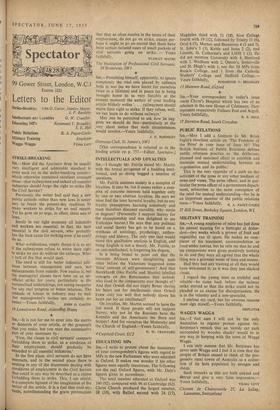INTELLECTUALS AND LOYALTIES
SIR,—I thought Mr. Fairlie slated Mr. Martin with the brutal arrogance of a budding intel- lectual, and so doing begged a number of questions.
Mr. Fairlie assumes society is a complex of loyalties. It may be, but it seems rather a com- plex of concrete interests held together only by one or two abstract loyalties. He says we must find the least harmful loyalty, but as any loyalty presupposes harming somebody and must therefore discount morality, why strain at degrees? (Personally I support Surrey for the championship and was delighted to see Yorkshire beaten.) He says that any political and social theory has got to be based on a synthesis of sociology, psychology, anthro- pology and history. The only one that would stand this qualitative analysis is English, and being English is not a theory. Mr. Fairlie.. as an anti-intellectual, is forgetting his dogma.
Is it being brutal to point out that the innocent Africans were slaughtering each other before the Victorians suggested some 'false' concept of self-government? And that Burckhardt (like Fairlic and Martin) labelled concepts on the Renaissance that nobody who lived in the cinqueccnto ever thought of? And that Orwell did not imply Boxer slaving his heart out for intellectuals since Orwell knew only too well that nobody slaves his heart out for an intellectual?
On loyalties, Mr. Martin seemed to have the last word. If these people will not support Surrey, why not let the Russians have the Kremlin and the Americans the Stars and Stripes? And for ourselves the Monarchy and the Church of England.—Yours faithfully, 4 Copthall Court. EC2
G. W. CRAWFORD


































 Previous page
Previous page